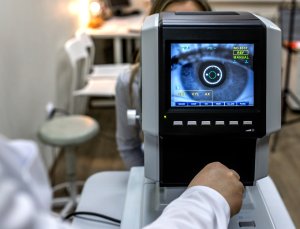Glaucoma Surgery Berks County

Voted Best of Berks—
eight years in a row!
According to the World Health Organization, glaucoma is the second leading cause of blindness in the world. Older adults are at a higher risk, but babies can be born with the disease. Damage from glaucoma is not reversible, and there is no cure. However, with prompt medical treatment and/or surgery, it is possible to prevent further vision loss.
If you are looking for highly skilled eye surgeons in the Berks County area, consider Eye Consultants of Pennsylvania. We are the leading ophthalmology practice in Berks, Schuylkill, Lebanon, Lancaster and Montgomery counties, with five convenient locations in Wyomissing, Pottsville, Pottstown, Lebanon and Blandon.
Offering the full spectrum of glaucoma related procedures are specialists Mehul H. Nagarsheth, MD, who received his medical degree from Drexel University College of Medicine and completed his glaucoma fellowship at Tufts New England Eye Center and Ophthalmic Consultants of Boston, and Abhishek Nemani, MD, who received his medical degree from the State University of New York Upstate Medical University in Syracuse and was fellowship-trained in at the prestigious Scheie Eye Institute at the University of Pennsylvania.
Are You at Risk for Glaucoma?
Everyone is at risk for glaucoma but, according to the Glaucoma Research Foundation, some individuals are at higher risk than others:
- Older individuals: Although glaucoma can affect people at any age, even infants, it occurs more frequently as we get older. Everyone over the age of 40 should have a comprehensive eye examination every one and a half to two years.
- Family history of glaucoma: According to researchers, open-angle glaucoma, the most common form of glaucoma, may be hereditary. Although you may not ever develop the disease, you are at a greater risk if members of your family have had glaucoma.
- People of African, Hispanic or Asian descent: Glaucoma is a leading cause of blindness in people of African descent, second only to cataracts. People with African and Hispanic ancestry are more prone to developing open-angle glaucoma than people of other races. People of Asian descent have a greater tendency for developing angle-closure glaucoma and normal-tension glaucoma.
- People who have:
- Diabetes
- Long-term steroid use for severe asthma control
- Extremely high or low blood pressure
- Blunt trauma or penetrating eye injury
Surgical Treatment for Glaucoma
Glaucoma can be treated with eye drops, medications, laser surgery, traditional surgery or a combination of these methods. When medications do not achieve the desired results, or have intolerable side effects, your ophthalmologist may suggest surgery.
Laser Surgery: Laser surgeries are popular for either initial glaucoma treatment or as an intermediate step between medications and traditional surgery. For open-angle glaucoma, the most common laser surgery is trabeculoplasty, in which the doctor uses the laser beam to make small changes in the eye’s drainage system to allow fluid to flow more easily and reduce the intraocular pressure. This is a painless procedure that takes 3 to 5 minutes. Complications are minimal, but long-term success rates are variable. Your doctor will be the best judge of determining whether or not you are a good candidate for glaucoma laser surgery.
Trabeculectomy: When medications and laser treatment are unsuccessful at lowering eye pressure, your doctor may recommend traditional surgery. The most common procedure is called a trabeculectomy, sometimes called filtration surgery, which is used in both open-angle and closed-angle glaucoma. The surgeon creates a passage to drain excess eye fluid from the inside of the eye to the outside by making a small hinged flap over a small hole in the white part of the eye (the sclera), which is covered by a thinner skin (the conjunctiva). The surgery is usually an outpatient procedure that takes 30 to 45 minutes. It is usually performed under local anesthesia
Other glaucoma surgeries include drainage implant surgery, new nonpenetrating surgery, and other promising options. Each patient is different, so talk with your doctor about the possible risks and benefits of each procedure.
Early detection and treatment of glaucoma are the only way to prevent further vision impairment and even blindness. Whether you and your doctor decide on medication or surgery, the best way to protect your vision is to get tested and talk with the board certified, fellowship trained glaucoma specialists at Eye Consultants of Pennsylvania.
For an appointment, call toll-free 1-800-762-7132.
Find a Doctor
Physician information including education, training, practice location and more.
Schedule an Appointment
Call 800-762-7132 or make an appointment online.





